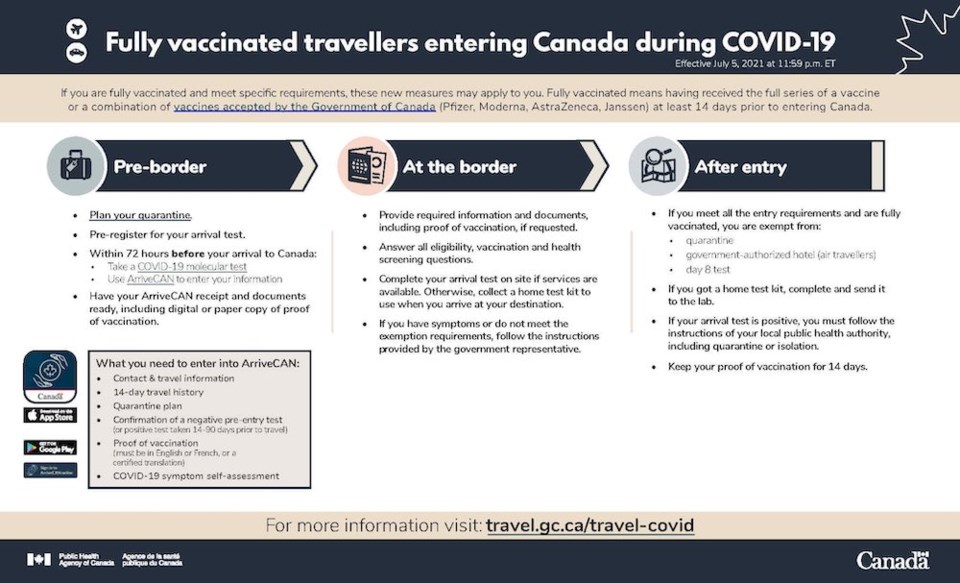Are you fully vaccinated?
While numerous Canadians have received one dose of a COVID-19 vaccine, many others are anxious about when they can roll up their sleeves for a second shot — especially after the federal government announced that fully vaccinated travellers may enter the country quarantine-free.
Beginning July 5 at midnight, fully vaccinated travellers who are permitted to enter Canada will not be subject to the federal requirement to quarantine or take a COVID-19 test on day-8. Additionally, fully vaccinated travellers arriving by air will not be required to stay at a government-authorized hotel.
To be considered fully vaccinated, a traveller must have received the full series of a vaccine — or combination of vaccines — at least 14 days prior to entering Canada.
Currently, the approved vaccines are manufactured by
- Pfizer
- Moderna
- AstraZeneca/COVISHIELD
- Janssen (Johnson & Johnson).
Travellers can receive their vaccine in any country and must provide documentation supporting their vaccination in English, French or with a certified translation.
Canadians who are not fully vaccinated
For travellers who are not fully vaccinated, there are no changes to Canada’s current border measures. They must continue to adhere to the current testing and federal quarantine requirements. They must also provide COVID-19-related information electronically through ArriveCAN before arriving in Canada. Additionally, unvaccinated air travellers must also book a three-night stay at a government-authorized hotel before their departure to Canada.
Canadians who are fully vaccinated
For these new measures to apply to them, fully vaccinated travellers must still meet all other mandatory requirements, including pre-arrival and on-arrival testing.
Fully vaccinated travellers must also be asymptomatic, have a paper or digital copy of their vaccination documentation, and provide COVID-19-related information electronically through the ArriveCAN app prior to arrival in Canada. They must still present a suitable quarantine plan, and be prepared to quarantine, in case it is determined at the border that they do not meet all of the conditions required to be exempt from quarantine.
As with all other exempt travellers, they will be required to follow public health measures in place, such as wearing a mask when in public, keep a copy of their vaccine and test results, as well as a list of close contacts for 14 days after entry to Canada.
Transport Minister Omar Alghabra shared an infographic that explains what Canadians who are fully vaccinated need to keep in mind when entering the country.
 Photo via Government of Canada
Photo via Government of CanadaFind more information .
More border reopening plans to be unveiled in coming weeks: Trudeau
Canadians should expect more announcements about loosening border restrictions to be made in the coming weeks, according to Prime Minister Justin Trudeau.
“I understand the impatience people have to get travelling again,” he said Tuesday while speaking outside his home in Ottawa.
The prime minister would not commit to a date about when the border would be fully reopened as the country deals with the ongoing COVID-19 pandemic.
Instead, he emphasized more than once that further details about easing international travel would be made available in the coming weeks rather than the coming months.
“We could have in the next number of weeks both more information and changes with respect to our posture at the border,” Intergovernmental Affairs Minister Dominic LeBlanc said at a briefing later in the day when asked to clarify whether border restrictions would be loosened further in the coming weeks or if Ottawa was only preparing to offer more details within that timeframe.
With files from Tyler Orton.


